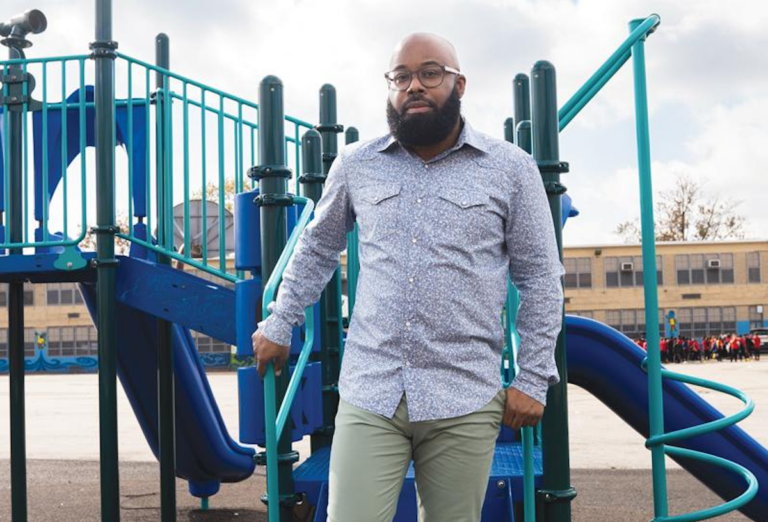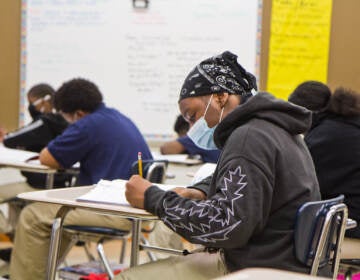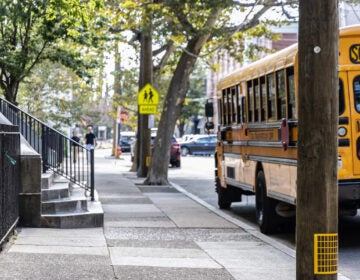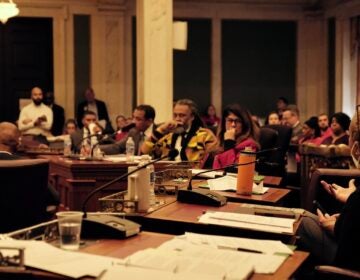Philly special ed teacher rose from school bus attendant with the help of the district’s ‘grow your own teacher’ effort
Gemayel Keyes testified before the U.S. Senate Committee on Health, Education, Labor and Pensions in Washington, D.C.

Gemayel Keyes, rose from school bus attendant to special eduction teacher at Spruance Elementary School in Northeast Philadelphia. Last week, he testified before the U.S. Senate Committee on Health, Education Labor and Pensions, which is seeking answers to the national teacher shortage at the invitation of Sen. Bob Casey. (Courtesy of American Federation of Teacher's website)
From Philly and the Pa. suburbs to South Jersey and Delaware, what would you like WHYY News to cover? Let us know!
About a decade ago, Gemayel Keyes started his career as a bus attendant in the Philadelphia School District and later became a paraprofessional in the classroom.
Today, Keyes is a special education teacher at Gilbert Spruance Elementary School in the city’s Northeast section.
“I stumbled upon what I would find as my calling,” Keyes said.
On June 20, Keyes testified about his journey to become a teacher with the help of the district’s paraprofessional-to-teacher pipeline program before the U.S. Senate Committee on Health, Education, Labor and Pensions in Washington, D.C. The committee is chaired by U.S. Sen. Bernie Sanders, I-Vt.
The program offers paraprofessionals like Keyes and anyone who wants to become a teacher, financial assistance for college courses and teacher certification, in return for a multi-year commitment to teach in the Philadelphia public schools.
“Paraprofessionals work alongside the teachers to keep the train on the tracks,” Keyes said. “They are essential for working with students who need additional attention and support.”
Pa.’s U.S. senator, Bob Casey, invited him to discuss his experience in the program with the hope that it might be a national model to help solve the nationwide teacher shortage, which is dire in the state and Philadelphia, in particular.
“Mr. Keyes shed light on the challenges educators and students face in Philadelphia and across the nation, from a lack of resources to understaffing to safety and inclusivity in our schools,” Casey said. “That’s why I am working to pass legislation to foster safe, supportive learning environments and help teachers get the resources they need to do one of the most critical jobs in the country.”
As a Black male teacher, Keyes is a rarity in Pennsylvania — just 3.8% of the state’s teachers are African American, and less than 1% are men, according to Research for Action, a nonprofit education research group.
In 2022, the School Board created the $2.5 million paraprofessional program.
Paraprofessionals are some of the lowest paid in the district, Keyes said, with annual salaries of between $16,000 and $30,000.
The program is part of the school district’s contract with the Philadelphia Federation of Teachers (PFT), representing the paraprofessionals. It is an effort to recruit more teachers, especially teachers of color, who are already working in the schools.
Keyes earned an associate’s degree at Harcum College in Bryn Mawr, Pa., and a bachelor’s degree from Eastern University in St. Davids, Pa. Both degrees are in early childhood education.
According to a 2022 report by the U.S. Department of Education, more than 40 states and Washington, D.C., are facing teacher shortages in at least one subject area or grade level.
In Pennsylvania, teacher shortage is most challenging in underserved rural and urban areas, and in the areas of special education, science and math.
“About 44% of public school teachers are quitting their jobs in less than five years,” Sen. Sanders said. “Why are they leaving in that profession?”
The reasons are many, Sanders said, including low pay and benefits, along with high anxiety and burnout, made worse by the pandemic.
There are about 2,000 teacher vacancies in Pennsylvania as of October 2023, according to Teach Plus, a nonprofit group that tracks the figures. In addition, another 6,500 are teaching on emergency certificates. The attrition rate for teachers is 6%, which is especially high.
The Pa. Department of Education issues emergency teacher certificates to public schools that are unable to hire teachers for positions that have been advertised. Candidates must meet all other criteria, such as a bachelor’s degree from a college or university approved by the state.
In 2023, the General Assembly passed a bipartisan legislation signed by Gov. Josh Shapiro that provided $10 million to pay a stipend of up to $15,000 to pay for a 12-week classroom internship needed to receive teacher certification, which is part of the state’s teacher pipeline program, to help alleviate the shortage.
Advocates for increasing the amount of money to pay for teachers in need of stipends, such as the Pennsylvania State Education Association (PSEA), estimate that the cost is $75 million.
PSEA represents about 180,000 teachers, school bus drivers and school nurses in the state.
For his part, Keyes urged the federal legislators to fund efforts such as the paraprofessional program he took advantage of, so communities can “grow their own teachers.”
“This is an issue of enormous consequences,” Sanders said. “There is nothing more important that we can do than to provide a quality education to all of our young people.”

Get daily updates from WHYY News!
WHYY is your source for fact-based, in-depth journalism and information. As a nonprofit organization, we rely on financial support from readers like you. Please give today.








